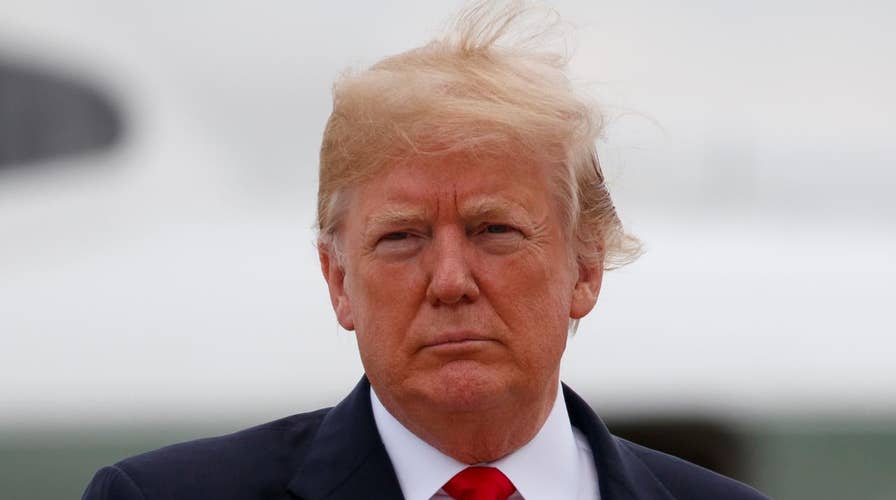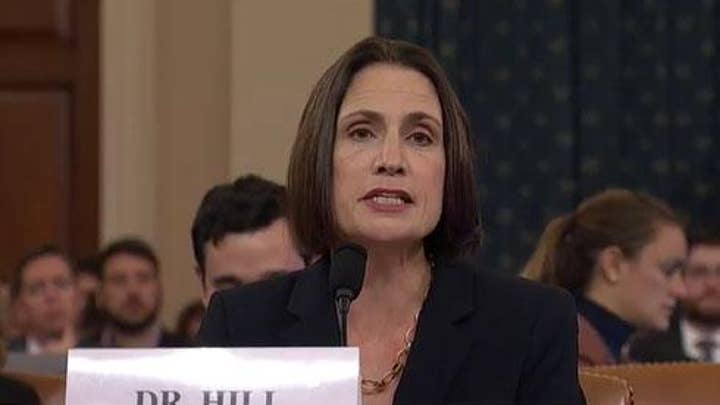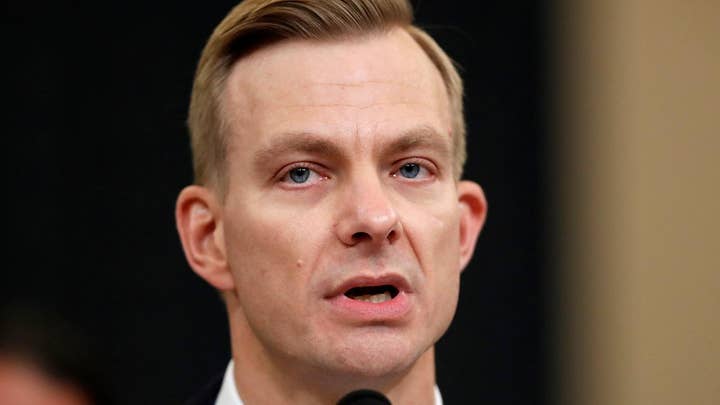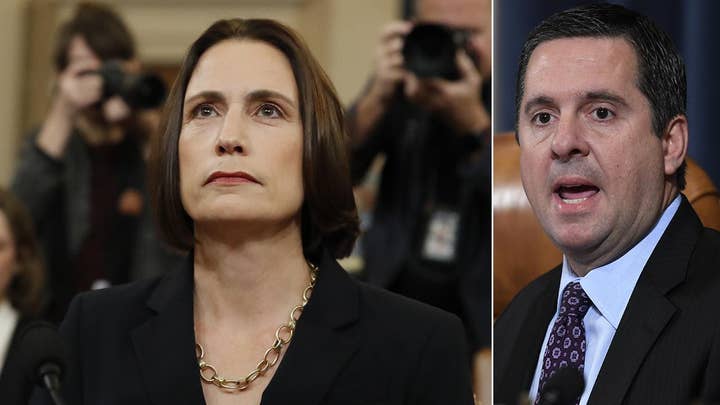Former National Security Council aide Fiona Hill clashed with Republicans during Thursday’s Trump impeachment inquiry hearings after accusing some lawmakers of embracing the “fictional narrative” that only Ukraine -- and not Russia -- interfered in the 2016 elections, igniting a fierce response.
The testy proceedings at the Capitol also included testimony from David Holmes, a U.S. State Department official in Ukraine, who described how he overheard a phone call this summer with President Trump about wanting Ukraine to conduct political investigations.
Holmes testified that he eventually understood that “demand” to be linked to delayed military aid. The White House countered, as it has in prior hearings, that the witnesses did not speak to any direct knowledge on the aid hold-up, while GOP lawmakers dismissed the alleged offense as nothing more than a “thought crime.”
FIONA HILL SAYS SHE WAS GIVEN STEELE DOSSIER JUST BEFORE IT WAS PUBLISHED
But Hill irritated Republicans from the outset Thursday by saying in her opening statement, “Based on questions and statements I have heard, some of you on this committee appear to believe that Russia and its security services did not conduct a campaign against our country—and that perhaps, somehow, for some reason, Ukraine did.”
Throughout the day, Republicans repeatedly addressed her claims. The top Republican on the committee, Rep. Devin Nunes, pushed back by holding up a copy of the GOP-led Intelligence Committee’s 2018 “Report on Russian Active Measures” finding that Russia interfered in the 2016 election.
“What you just said was not true…but you felt the need to put it in your eight-page statement,” Rep. Mike Turner, R-Ohio, told her.
New York Rep. Elise Stefanik said: “Not a single Republican member of this committee has said that Russia did not meddle in the 2016 elections.”
Ohio Rep. Brad Wenstrup told Hill her statement was “false,” saying she was just repeating “Mr. Schiff’s narrative,” referring to the Democratic committee chairman. “That’s where you’ve heard it. We did a whole report on it.”
The transcript of Trump's July 25 call with Ukranian President Volodymyr Zelensky -- a moment at the heart of the impeachment probe -- shows Trump asking for a “favor” in the form of Ukraine providing information about the hacking of the DNC server in 2016. He referenced CrowdStrike, a cyber firm used by the DNC to investigate the attacks.
Hill acknowledged in her testimony that her comments were in reference to those allegations.
“These fictions are harmful even if they are deployed for purely domestic political purposes,” Hill said, also saying "if the president, or anyone else, impedes or subverts the national security of the United States in order to further domestic political or personal interests, that is more than worthy of your attention."
She later, though, acknowledged that reporting from a 2017 Politico story indicated Ukrainian officials sought to "curry favor" with the Clinton campaign. “They bet on the wrong horse … They bet on Hillary Clinton winning the election,” she said, noting some officials disparaged Trump, but drawing a distinction between those issues and Russian meddling.
IMPEACHMENT WITNESS FIONA HILL ONCE OPPOSED SENDING LETHAL AID TO UKRAINE IN FIGHT WITH RUSSIA
Democrats have dismissed the notion that Ukraine played a role in the 2016 race. But Republicans throughout the hearing have repeatedly asked witnesses about a separate Ukraine-related allegation involving Alexandra Chalupa—a former Democratic National Committee consultant who allegedly had meetings during the 2016 campaign with officials at the Ukrainian Embassy in D.C. to discuss incriminating information about Trump campaign figures, as detailed in the Politico story.
"At the same time, certain Ukrainians did work against candidate Trump," Wenstrup said. "Some with the DNC."
Nunes -- the top Republican on the Intelligence Committee -- accused Democrats during the hearing of "improperly redacting [Chalupa's] name from deposition transcripts and refusing to let Americans hear her testimony as a witness in these proceedings."
The Russia probe and the 2016 election were frequently referenced by Nunes in the hearing. Hill acknowledged that she knows Christopher Steele, the author of the infamous dossier of conspiracy theories about Trump, and was shown an early copy of the document.
Referencing the Democrat-funded dossier, Nunes asked both Hill and Holmes if they think it’s appropriate for political parties to send operatives into foreign countries to dig up dirt on their opponents. Both said no.
The testimony came on the last scheduled day -- at this time -- of open impeachment hearings before the Intelligence Committee, which hosted a spree of five hearings spread across three days this week.
The inquiry, at its core, has focused on how Trump pressured Zelensky to announce investigations related to the Bidens, as well as alleged actions taken by Ukraine in the 2016 election, as military aid was withheld.
Holmes, the U.S. State Department official in Ukraine, testified about a Sept. 8 conversation where Bill Taylor, the top diplomat in Ukraine, told him Trump's advisers wanted Zelensky to commit to going on American television to announce an investigation.
“This was a demand that President Zelensky personally commit, on a cable news channel, to a specific investigation of President Trump’s political rival,” Holmes said, adding, “I was shocked the requirement was so specific and concrete.”
The interview never happened, and the aid was eventually released, a fact that Republicans have cited to counter Democrats' allegations.
Speaking to lawmakers, Holmes said he eventually got the "clear impression" that the hold on aid was "likely intended" to prod Ukraine over the desired investigations -- related to former Vice President Joe Biden's role in the ouster of a prosecutor who had been looking into Ukrainian energy company Burisma Holdings where his son Hunter was on the board. Hill said Thursday: "It was clear Burisma was code for the Bidens."
Trump has maintained there was no "quid pro quo," however, and Republicans have panned such witness assertions as speculation.
"These two witnesses, just like the rest, have no personal or direct knowledge regarding why U.S. aid was temporarily withheld," White House press secretary Stephanie Grisham said in a statement.
But Holmes offered a first-hand account all the same of how he overheard a July 26 call between Trump and European Union Ambassador Gordon Sondland where the president asked Sondland whether Zelensky was going to conduct the investigations he wanted.
Holmes said Sondland, who was in Ukraine for meetings, began the call by telling Trump that Zelensky “loves your ass.”
“I then heard President Trump ask, ‘So, he’s gonna do the investigation?’ Ambassador Sondland replied that ‘he’s gonna do it,’ adding that President Zelensky will do ‘anything you ask him to,’” Holmes said.
Holmes explained how he heard the call.
“While Ambassador Sondland’s phone was not on speakerphone, I could hear the president’s voice through the earpiece of the phone,” Holmes said. “The president’s voice was very loud and recognizable, and Ambassador Sondland held the phone away from his ear for a period of time, presumably because of the loud volume.”
Trump, in real-time, tweeted his skepticism.
"I have been watching people making phone calls my entire life. My hearing is, and has been, great," the president tweeted during the hearing. "Never have I been watching a person making a call, which was not on speakerphone, and been able to hear or understand a conversation. I’ve even tried, but to no avail. Try it live!"
CLICK HERE TO GET THE FOX NEWS APP
On Thursday, Holmes also detailed how State Department officials were frustrated with Trump lawyer Rudy Giuliani's involvement in Ukraine policy.
"My recollection is that Ambassador Sondland stated, 'Dammit Rudy. Every time Rudy gets involved he goes and f---s everything up.'”
Hill, too, recalled comments from former National Security Adviser John Bolton describing Giuliani as a "hand grenade" and the issues being pursued by Sondland and White House Chief of Staff Mick Mulvaney as a "drug deal" that he wouldn't be a part of.
Holmes also recalled asking Sondland during that lunch if it was true that Trump did not “give a s--t about Ukraine.”
Describing that conversation, he said, “Ambassador Sondland agreed that the president did not ‘give a s--t about Ukraine.’ I asked why not, and Ambassador Sondland stated that the president only cares about ‘big stuff.’ I noted that there was ‘big stuff’ going on in Ukraine, like a war with Russia, and Ambassador Sondland replied that he meant ‘big stuff’ that benefits the president, like the ‘Biden investigation’ that Mr. Giuliani was pushing.”
Hill told House investigators she came to realize Sondland wasn't simply operating outside official diplomatic channels, as she and others suspected, but carrying out instructions from Trump.
"He was being involved in a domestic political errand, and we were being involved in national security foreign policy," she testified, "and those two things had just diverged."
Holmes also testified that he drafted a cable from Taylor, the top diplomat in Ukraine, to Secretary of State Mike Pompeo about the importance of the security aid, as it was being held up.
Holmes said he didn’t know the reason for the delay, but “by this point, however, my clear impression was that the security assistance hold was likely intended by the president either as an expression of dissatisfaction that the Ukrainians had not yet agreed to the Burisma/Biden investigation or as an effort to increase the pressure on them to do so.”
Asked about testimony from prior witnesses, Hill took issue with how a prior witness claimed she had reservations about the judgment of Lt. Col. Alexander Vindman – another NSC official who testified against Trump this week. Instead, she said she worried that he lacked the political chops to navigate the increasingly heated conflict over the White House's strategy.
"I did not feel that he had the political antennae,” she said.
Opening the hearing on Thursday, House Intelligence Committee Chairman Adam Schiff, D-Calif., said lawmakers in the coming days will “determine what response is appropriate” after the recent testimony.
“It will be up to us to decide, whether those acts are compatible with the office of the presidency,” Schiff said.
Nunes, in his opening remarks, dismissed the accusations, saying, "So how do we have an impeachable offense here when there’s no actual misdeed and no one even claiming to be a victim?"
Nunes said: "The Democrats have tried to solve this dilemma with a simple slogan: 'He got caught!' President Trump, we are to believe, was just about to do something wrong, and getting caught was the only reason he backed down from whatever nefarious thought-crime the Democrats are accusing him of almost committing."
Trump on Thursday railed against the proceedings as a "phony impeachment hoax." He denied putting pressure on Ukraine and tweeted, "I never in my wildest dreams thought my name would in any way be associated with the ugly word, Impeachment!"
The Associated Press contributed to this report.















































